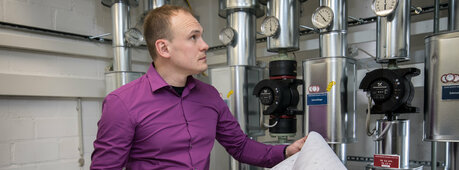Costs for water, heating & more
What wbg uses operating cost contributions for
Operating and heating cost statements are becoming more and more extensive due to ongoing court rulings and legal changes, and this often raises questions. To give you a better understanding of the complex topic of operating costs, we have compiled a list of frequently asked questions on the subject of ancillary costs. The individual agreements made with you in the tenancy contract are also important.

Operating costs are costs that owners or leaseholders incur on an ongoing basis as a result of their ownership or leasehold of the property or as a result of the intended use of the building, outbuildings, facilities, equipment and land. Operating costs do not include administration and repair/maintenance costs.
When allocating the types of operating costs, wbg Nürnberg follows the German Operating Costs Ordinance (the “Betriebskostenverordnung”, or “BetrKV”). This regulates which types of costs may be charged to the tenant in the operating cost statement. The following types of costs are involved:
- The ongoing public charges of the property (e.g. property tax, rainwater)
- The costs of water supply
- The costs of drainage (e.g. canal fees)
- The costs of operating the central heating system including the flue gas system or similar
- The costs of operating the central hot water supply system or similar
- The costs of associated heating and hot water supply systems or similar
- The costs of operating the passenger or goods lift (e.g. maintenance, TÜV etc.)
- The costs of street cleaning and refuse disposal
- The costs of building cleaning and pest control
- The costs of garden maintenance (e.g. mowing, pruning, etc.)
- The costs of lighting (e.g. lighting stairwells, cellar corridors, etc.)
- The costs of chimney cleaning
- The costs of property and liability insurance (e.g. building insurance, household liability insurance)
- The costs of the caretaker (e.g. property manager)
- The costs of operating the communal antenna system or the operation of the private distribution installation connected to a broadband cable network (no TV licence fees)
- The costs of operating the laundry facilities
- Other operating costs (e.g. maintenance of building services, smoke alarms, gutter cleaning, underground car park cleaning, etc.)
The settlement period always covers a whole year. As a rule, it corresponds to the period from January 1 to December 31 of each year.
If you only live with us as a tenant for part of the year, all costs for one year must still be taken as the basis for the “total annual costs”. However, the costs will only be charged on a pro rata basis for the period in which you had a tenancy agreement with us. In the case of individual consumption-based costs, only the costs actually incurred during the tenancy agreement period will be charged. Interim settlements for tenants who have moved out are not possible, nor is an early settlement before the end of the settlement year.
According to the legal requirements, landlords must send the statement to the tenant by the end of the 12th month after the end of the settlement period.
Example: Settlement period 01/01 – 31/12 -> The owner must send the statement to the tenants by December 31 of the following year.
For most types of costs, the statutory allocation formula “living space” is used. Exceptions are usually agreed in the tenancy agreement for the following types of costs: Winter service, house cleaning and cable fees are charged according to the proportion of the residential units. Water and sewerage costs, if metering devices are available in the flats, are charged according to consumption.
Most types of costs are calculated according to square metres. This leads to different settlement results for flats of different sizes. If the settlement results differ for flats of the same size, this may be due to the following reasons, among others:
- Consumption-based cost types (e.g. heating or water costs)
- Directly allocated cost types (e.g. maintenance of gas appliances)
- Different prepayment amounts
- Different periods of use (when a tenant moves in or out)
- Different allocation agreements from old or new tenancy agreements
As a tenant, you can declare certain services and craftsman services (§35a of the German Income Tax Act, or “EStG”) in your annual tax return. Therefore, these costs are shown separately in the statement of operating costs. For each household, these amounts can only be included once in the tax return. However, we exclude any guarantee for the actual approval for tax purposes. It is up to the individual tax offices which amounts are ultimately approved as tax-relevant.
Tenants can influence the consumption-based costs in particular. These are mainly the cost type for heating, but also for water and sewage costs (if there is a meter in the flat) and electricity costs. Costs can be actively reduced by being economical in consumption.
Yet there are also ways to reduce costs for cost types that are not consumption-based. By separating waste correctly, avoiding unauthorised storage of bulky waste or by taking good care of jointly used parts of the building, such as the staircase or the outdoor facilities.
We must be informed in writing of any changes to your bank account so that we can guarantee timely direct debits or payments of operating cost credits. You’re also welcome to inform us of your new bank details via our app or our tenant portal “Meine wbg”.
If you have any further questions about the operating costs statement, please do not hesitate to contact us: CONTACT

